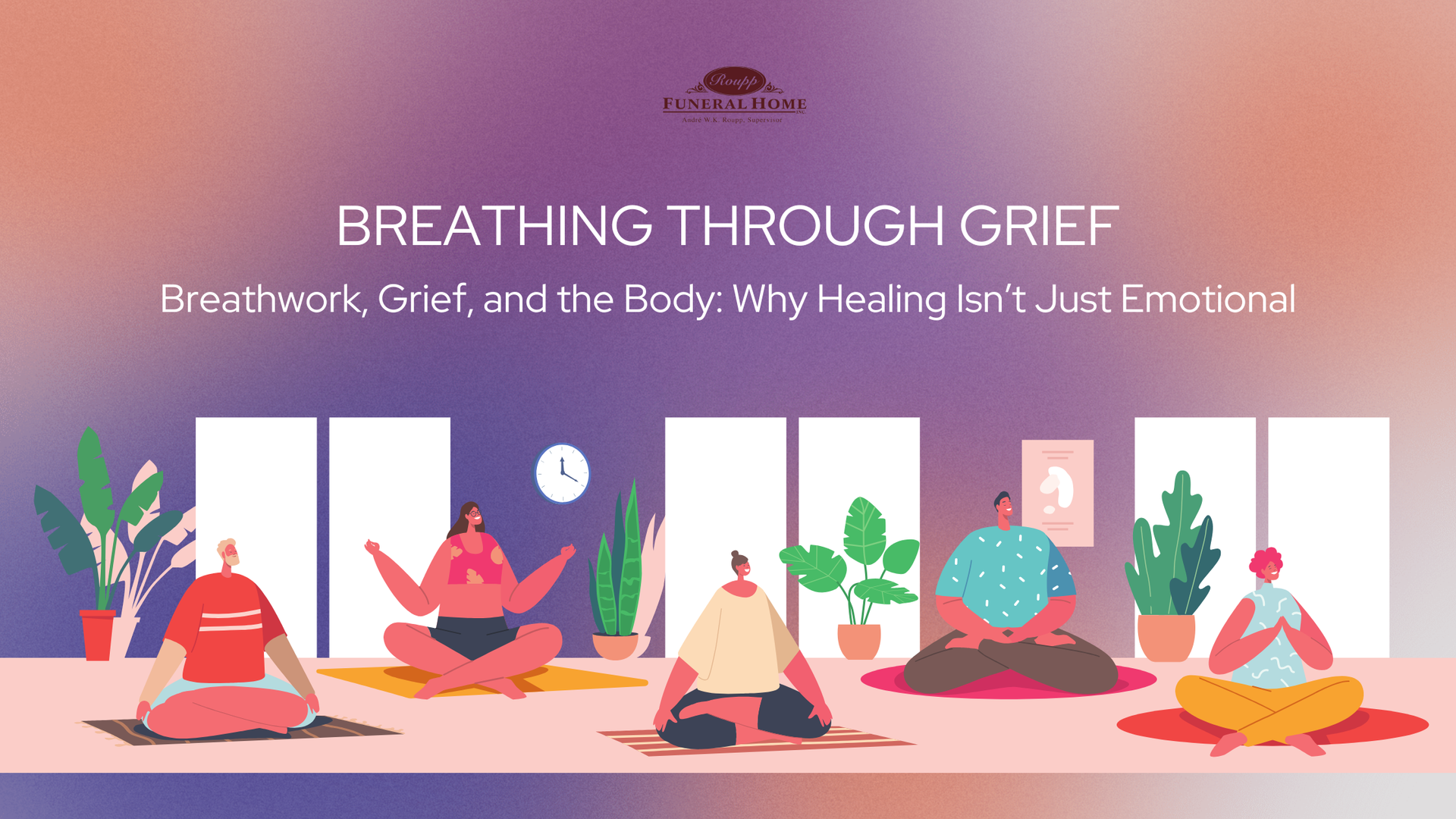Roupp Funeral Home Blog
Keep up with the latest news, events, and information from Roupp Funeral Home here at our blog.

For many people, the holiday season is filled with expectations of togetherness, joy, and tradition. When you’re grieving the loss of a loved one, those expectations can feel especially heavy. And while the holidays themselves can be difficult, many people are surprised to find that their grief feels even heavier after the holidays are over . If you’ve entered the new year feeling emotionally drained, sad, or disconnected, you are not alone, and there is nothing wrong with you. January often brings what many describe as an emotional crash . The decorations come down, routines return, and the world seems to move on, even though your heart may still be catching up. The Emotional “Crash” After the Holidays During November and December, many grieving individuals operate in a kind of emotional survival mode. There are events to attend, family obligations, traditions to manage, and social expectations to meet. Even if the holidays were quiet or low-key, they often require extra emotional energy. You may find yourself: Holding it together for others Staying busy to avoid painful emotions Focusing on “getting through” each day Once the holidays pass, that structure disappears. The calendar clears. The distractions fade. And suddenly, there is space. A space where grief can feel louder and heavier than before. This emotional drop can be jarring, especially when a new year is culturally framed as a time of fresh starts and positivity. While others may feel hopeful or motivated, you may feel the opposite: tired, sad, or deeply lonely. Why Grief Can Feel Delayed One reason grief often intensifies after the holidays is delayed grief . When you’re in a period that requires emotional endurance, such as the holiday season, your mind and body may temporarily suppress deeper feelings simply to get through it. When life slows down in January, those emotions finally have room to surface. Delayed grief doesn’t mean you’ve been avoiding your loss or grieving “incorrectly.” It’s a natural response to emotional overload. Grief often unfolds in waves, and it’s common for those waves to arrive when things become quieter. You might notice: Strong emotions appearing unexpectedly Increased sadness or tearfulness A sense that the loss feels “new” again Guilt for feeling worse now than you did during the holidays All of these experiences are normal. The Exhaustion of Grieving Through the Holidays Grief is not just emotional; it is physical. The holidays often demand more from us at a time when we already feel depleted. By January, many grieving individuals are simply exhausted . Grief-related exhaustion may look like: Trouble sleeping or sleeping too much Difficulty concentrating Low energy or motivation A sense of heaviness in the body Winter can intensify this fatigue. Shorter days, cold weather, and reduced social interaction may amplify feelings of isolation and sadness, especially for those already navigating loss. If you feel worn down, it doesn’t mean you’re not healing. It means you’ve been carrying a lot. When the World Moves On, But Your Grief Doesn’t One of the most painful parts of post-holiday grief is the feeling that support suddenly disappears . During the holidays, people may check in more often or acknowledge your loss. Once January arrives, those conversations often stop, not because others don’t care, but because they assume you’re “doing better.” Grief doesn’t follow a calendar. It doesn’t reset with the new year. And it doesn’t end because the holidays are over. It’s okay if: You’re still struggling You don’t feel ready for “normal” yet The new year feels overwhelming instead of hopeful Your timeline is your own. Giving Yourself Permission to Feel What You Feel January can bring pressure to set goals, embrace positivity, or “move forward.” For someone who is grieving, that pressure can feel isolating or even painful. Instead of asking yourself what you should feel, try allowing yourself to feel what is actually present. That might mean: Taking things one day at a time Saying no to unnecessary obligations Seeking quiet moments of rest and reflection Reaching out for support when the weight feels too heavy Grief is not something to fix; it’s something to be carried with care. Support During the Quiet Months If grief feels heavier after the holidays, it may be a sign that you could benefit from additional support. Many people find January to be a meaningful time to connect with grief support groups, counseling, or community resources, when things are quieter, and there is space to focus on healing. At Roupp Funeral Home , we believe care doesn’t end after the service. We are committed to supporting families as they continue their grief journey, long after the holidays have passed. Join us for our Winter Grief Support Group Program - Navigating Grief taking place every Tuesday in 2026 until February 24th at 6:30pm. If you are struggling, know that you don’t have to walk this season alone. These sessions are open to all at no cost. To learn more, please visit: https://www.eventbrite.com/e/1967664846524

When people think about grief, they often think of emotions like sadness, anger, confusion, or longing. But grief doesn’t live only in the heart or the mind. Grief lives in the body , too. For many who are grieving, the body holds tension, fatigue, restlessness, and pain long after words feel unavailable. This is why healing after loss isn’t just emotional, it’s physical, nervous-system-based, and deeply embodied. Understanding how grief affects the body can be an important step toward gentler, more complete healing. How Grief Lives in the Body Grief activates the body’s stress response. When a significant loss occurs, the nervous system often shifts into a state of heightened alert, commonly known as fight, flight, or freeze . While this response is protective in the short term, it can become exhausting when grief is prolonged. You may notice physical symptoms such as: Tightness in the chest or throat Shallow breathing or frequent sighing Fatigue or heaviness in the body Restlessness, anxiety, or difficulty sleeping Headaches, muscle tension, or digestive changes These symptoms are not signs that something is “wrong” with you. They are signs that your body is responding to loss in the way it knows how. Why Talking Isn’t Always Enough Talking about grief can be helpful, but many people find that words alone don’t fully address what they’re feeling. This is because grief is not just a cognitive experience ; it’s a physiological one. Sometimes the body needs support before the mind can feel relief. When grief is stored in the body, it may show up as: Feeling stuck or numb Feeling overwhelmed without knowing why Becoming easily triggered or emotionally flooded Difficulty relaxing, even in safe environments This is where body-based practices, such as breathwork, can play a meaningful role. What Is Breathwork? Breathwork is a gentle, intentional practice that focuses on using the breath to support the nervous system. Unlike everyday breathing, breathwork invites awareness, slowing, and regulation, helping the body shift out of stress and into a state of safety and calm. In the context of grief, breathwork can help: Release physical tension held in the body Calm the nervous system Create space for emotions to move without force Encourage grounding and presence Support rest and emotional regulation Breathwork does not require you to relive your loss or “fix” your grief. Instead, it offers a quiet way to listen to the body and respond with care. When the nervous system feels safe, the body is better able to process loss. Breathwork works by signaling safety, slowing the heart rate, softening muscle tension, and deepening the breath. This can be especially helpful for those who: Feel emotionally overwhelmed Struggle with anxiety or panic related to grief Feel disconnected from their body Have difficulty resting or sleeping For many, breathwork becomes a way to meet grief without pressure. Allowing emotions to surface naturally, at a pace the body can handle. Breathing Through Grief The winter months, especially after the holidays, can feel quiet and heavy. January often brings fewer distractions and more space, sometimes more space than feels comfortable when you’re grieving. This quieter season can also be a meaningful time to focus on gentle care, reflection, and support. Practices like breathwork align naturally with winter’s slower rhythm, offering warmth, grounding, and connection during a time that can feel isolating. In recognition of how deeply grief affects both the body and the mind, Roupp Funeral Home is offering a Breathwork for Grief session on January 20th , as part of our continued commitment to supporting families beyond the funeral service. This session is designed to: Provide a safe, supportive space for grief Offer gentle breathwork practices accessible to all Support relaxation and nervous system regulation Allow participants to connect with their grief without pressure or expectation No prior experience with breathwork is required. This session is not about forcing healing, it’s about creating space for it. Open to all at no cost. To learn more, and to reserve your spot, please visit: https://www.eventbrite.com/e/breathing-through-grief-tickets-1977966789914 You Don’t Have to Carry Grief Alone Grief asks a lot of the body. If you’ve been feeling exhausted, tense, or disconnected, it may be your body’s way of asking for care. Healing doesn’t mean forgetting. It doesn’t mean moving on. It means learning how to carry loss in a way that honors both your loved one and yourself. At Roupp Funeral Home , we believe that grief support should be compassionate, holistic, and ongoing. Whether through conversation, community, or body-based practices like breathwork, we are here to walk alongside you during the holidays, after them, and in the quiet months in between. If you feel called to explore a gentler way of supporting your grief, we invite you to join us. You are not alone and your body deserves care, too.

As the year winds down and we prepare to welcome a fresh start, many people begin reflecting on the things that matter most, like family, peace of mind, and creating a meaningful future. New Year’s resolutions often include organizing our homes, tidying up finances, and finally tackling those life details we’ve been putting off. One important but often overlooked part of planning ahead is pre-planning your funeral. While it may not be the first thing on your holiday checklist, taking a little time now to put arrangements in place can be an incredible gift to your loved ones, and to yourself. At Roupp Funeral Home, we believe that pre-planning is about living well today by easing the worries of tomorrow. Here’s why you should pre-plan a funeral before the new year: Peace of Mind Going Into the New Year There is something powerful about checking an important task off your list before January 1. Pre-planning allows you to: Document your wishes Select the type of service that reflects your life Ensure your final arrangements honor your values Instead of leaving loved ones to guess what you would want, you can give them clarity and comfort. Beginning the New Year with peace of mind allows you to focus on what matters most. A Gift of Love for Your Family Losing someone you love is never easy. Planning a funeral while grieving can feel overwhelming. When your wishes are already in place, your family can focus on sharing memories and supporting one another rather than making rushed decisions. Pre-planning: Reduces emotional stress Prevents confusion or disagreements Provides comfort knowing everything is taken care of It is one of the most thoughtful acts of love you can offer. Lock In Today’s Prices and Save Money Funeral costs, like many other expenses, rise over time. When you plan in advance, you can often lock in pricing at today’s rates, which can result in meaningful savings later. Pre-funding your arrangements allows you to: Budget at your own pace Avoid future price increases Protect your family from unexpected expenses End-of-year financial planning may already be on your mind, so this can easily fit into those conversations. Personalize a Service That Reflects Your Life Your story is one of a kind. Pre-planning gives you the opportunity to design a service that reflects your personality, your values, and the things you cherish. You can choose elements such as: Burial or cremation Music, readings, or faith traditions Photos, videos, and personal touches Location and style of service This ensures your loved ones can celebrate your life in a way that feels right and meaningful. The Perfect Time to Have the Conversation The holidays bring families together. While this topic can feel sensitive, many families appreciate having clarity and knowing they are honoring their loved one’s wishes. Having the conversation now means: Everyone understands your choices Loved ones feel included You avoid uncertainty later on Talking about your plans can bring surprising relief and peace to everyone involved. A Fresh, Organized Start Many people use December to catch up on estate planning, such as reviewing wills and organizing important documents. Pre-planning naturally fits into this organizing process and helps keep everything in one place. It is another way to remove worry, stay prepared, and protect your wishes moving into the New Year. Pre-planning your funeral is one of the most caring choices you can make for your family. Our compassionate team at Roupp Funeral Home is here to guide you at your own pace and answer any questions along the way. Even taking a few small steps now can make a big difference later. If you are interested in learning more or starting the process, we are always here to help. Call us at 5709662402 Visit us at Roupp Funeral Home Start planning online at: Online P r eplanning Form | Roupp Funeral Home Make this the year you give your family the comfort of knowing everything is handled. Begin the New Year with confidence, protection, and peace of mind.

The funeral home industry as we know it today has a rich and evolving history. Over the centuries, the way we care for, prepare, and memorialize the deceased has transformed significantly, from home-based rituals to specialized death-care institutions. Understanding this history gives us insight into how modern funeral homes came to be and the meaningful role they serve in communities. 1. Early Roots: Death in the Home Before the mid-1800s, most Americans died at home, and the family made funeral arrangements. The body was often displayed in the family parlor, and loved ones would gather in that intimate setting to mourn. This tradition is where the term "funeral parlor" originates. ( blog.hooperfuneralchapel.com ) Because bodies were not required to be preserved for public viewings, there was little need for embalming or long delays between death and burial. The family took care of the washing, dressing, and viewing, all in the home. ( ccgsilib.org ) 2. The Civil War and the Rise of Embalming A turning point came during and after the American Civil War. The assassination of President Abraham Lincoln in 1865 played a major role in shifting public perception: Lincoln’s body was embalmed so it could be transported and viewed across the country, something that caught the public’s attention. Because of this, embalming started to gain popularity. It allowed bodies to be preserved, enabling people to hold funerals later and in locations other than the home. 3. Birth of the Modern Funeral Home As embalming became more commonplace, the business of death care evolved. Undertakers, now called funeral directors, began offering more services: preparing the body, coordinating transportation, and hosting viewings. These services outgrew the family parlor. Some early undertakers were also coffin makers or furniture store owners. Their background in carpentry made it natural for them to build coffins, and eventually they expanded into full funeral services. By the early 1900s, there was enough demand and complexity in the business that formal training became necessary. The National Funeral Directors Association (NFDA) was formed to help standardize the profession, encourage ethical practices, and elevate the role of the funeral director as a credible, professional service provider. 4. Growth Through the 20th Century In the decades that followed, funeral homes multiplied across America. By 1920, there were tens of thousands of funeral homes operating. These institutions became a fixture in communities, offering a variety of services, from traditional burials to memorial services. As the population grew more mobile, funeral homes adapted by providing transportation, embalming, and viewing spaces so families could arrange meaningful farewells. ( case.edu ) 5. Cultural and Religious Diversification Funeral homes in the United States did not just reflect changing technology; they also adapted to shifting cultural and religious landscapes. As immigration laws relaxed in the mid-20th century, more diverse religious and ethnic groups entered the mainstream. Funeral homes responded by expanding their offerings to serve different faith traditions, dress preferences, language needs, and burial rites. 6. Criticism and Reform Despite its growth, the funeral industry has faced criticism. One of the most famous criticisms is Jessica Mitford’s 1963 book, The American Way of Death , which exposed exploitative practices within the funeral business. ( en.wikipedia.org ) Over time, concerns about cost, transparency, and ethics have prompted reform, more consumer education, and changes in how funeral services are structured. The History of Roupp Funeral Home At Roupp Funeral Home, our story is rooted in family, community, and a deep commitment to serving those in their most difficult moments. Our journey began in 1985 when we purchased the Strunk Funeral Home in Mifflinburg, Pennsylvania, and in 1992, we moved to our current location on Old Turnpike Road to better serve our growing community. Our director, Andre W. K. Roupp, has been honored to carry on a family legacy of funeral service. Growing up surrounded by the compassionate work of his grandfather, C. Brainard Kuhl, Andre felt called to help families navigate grief with care, respect, and understanding. After earning his degree in Mortuary Science and completing his apprenticeship, he returned home to dedicate himself fully to this community. Every day, our team strives to provide personal, compassionate care to families from all walks of life. We take pride in walking alongside you through life’s most challenging moments, helping you honor your loved ones with dignity, warmth, and a personal touch. At Roupp Funeral Home, you are treated like family, because that is what our community deserves. Why the History Matters Understanding the history of funeral homes helps us appreciate the traditions, practices, and dedication that shape our work today. While our services have evolved over the years, our mission remains the same: to provide comfort, guidance, and compassionate care to every family we serve. By learning about the roots of funeral service, we can honor the past while providing modern, personalized care that meets the needs of today’s families. At Roupp Funeral Home, we combine professional expertise with the personal touch that only a family-owned, locally-rooted funeral home can offer. Funeral homes have come a long way from simple home-based care to the professional, compassionate institutions we rely on today. At Roupp Funeral Home, we are proud to carry on this history while serving our community with heart and dedication. We are honored to walk alongside families during life’s most challenging moments, helping create meaningful, lasting memories of the loved ones you hold dear.

If you thought cremation was some modern invention born of stainless steel and LED screens, prepare to be pleasantly surprised. Cremation has a surprisingly long, winding, and, dare we say, fascinating history. Let’s light the torch (figuratively) and walk through time together. 1. Cremation in the Stone Age and Bronze Age Believe it or not, cremation likely began in the early Stone Age, around 3000 B.C., somewhere in Europe or the Near East. Back then, humans began experimenting with fire and burial practices, and some communities started using fire in disposal of their dead. Over time, especially in the late Stone Age, the practice spread across northern Europe. Archaeologists have found decorative urns and cremation burial sites in western Russia, indicating that ashes and burial urns became part of ritual life. When the Bronze Age (approximately 2500–1000 B.C.) kicked in, cremation expanded into the British Isles, Iberia (modern Spain & Portugal), and central Europe. Cemeteries specifically for cremated remains appeared in places like Hungary and northern Italy. By the time of Homer (circa 800 B.C.), cremation was prominent in the Greek world, often used for fallen warriors, partly because cremating a body was faster and considered more sanitary in war-torn contexts. 2. Romans, Religion & the Rejection of Flame The early Romans adopted cremation (some time around 600 B.C.), and it became deeply woven into Roman funeral culture. By the height of the Roman Empire, cremation was so commonplace that columbaria (structures with niches for urns) were a familiar sight. That said, the popularity of cremation wasn’t universal. Early Christians generally rejected it, viewing it as pagan, and Jewish tradition favored in-ground burial. As Christianity spread (especially after Constantine), earth burial gradually overtook cremation in Europe. By around 400 A.D., burial was essentially the norm, and cremation was rarely practiced except in extraordinary conditions (e.g. plagues, wartime). For roughly 1,500 years, cremation more or less slumbered in Europe’s funeral practices. 3. Reintroducing Cremation in the 19th Century The modern cremation movement, the kind that looks at urns, designated cremation facilities, and simplified dispositions, actually began only in the 19th century. In 1873, Professor Ludovico Brunetti in Italy presented a dependable mechanical cremation chamber at the Vienna Exposition. That demonstration is often considered one of the sparks (pun intended) for the international cremation revival. In England, Sir Henry Thompson (Queen Victoria’s surgeon) championed cremation partly because of sanitary concerns about overcrowded cemeteries. He helped found the Cremation Society of England in 1874. The first crematories in Europe started appearing around 1878 (Woking, England; Gotha, Germany). 4. The First U.S. Crematory Here’s a fun fact for those of us who live in PA: the first crematory in the United States was built in Washington, Pennsylvania by Dr. Julius LeMoyne in 1876. That little building (still standing as a historical landmark) helped usher in a new era of funeral options in America. Shortly afterward, the second crematory popped up in Lancaster, PA (in 1884). Protestants and medical professionals were often early supporters of cremation, citing improved public health (fewer buried bodies, fewer crowded cemeteries). By 1900, there were about 20 crematories in the U.S., and by 1913 there were 52 in North America. By the late 20th and early 21st century, cremation was no longer a fringe option. In 1975, the Cremation Association of America became the Cremation Association of North America (CANA), reflecting its broader coverage. At that time, there were 425+ crematories and nearly 150,000 cremations annually. Fast forward: by 2019, over 3,000 crematories were operating in the U.S., and more than 54 % of all U.S. deaths were resolved via cremation. 5. Cultural, Religious, and Practical Motives Through History Cremation didn’t just spread because of convenience. Over time, people adopted it for many reasons: Health & Sanitation: In eras when burial grounds became overcrowded or water tables were threatened, proponents argued that cremation reduced disease risks. Space & Land Use: As land became more valuable (especially near cities), cremation offered a way to reduce the land footprint of funerals. Religious Shifts: While early Christians resisted cremation, many modern Christian, Buddhist, Hindu, and secular traditions accept or even favor it. Cost: In many cases, cremation (especially without a fancy casket) can cost less than full traditional burial, a practical reason for many families. Personal Values: Some choose cremation for environmental reasons, or simply because they prefer simplicity or flexibility in memorial options. 6. The Cremation Process: How We Do It Today (Without Getting Too Technical) Modern cremation is quite different from the pyre-in-the-forest image from ancient times. Here’s a simplified (and gentle) rundown: Preparation: The body is received, medical devices or pacemakers removed, and identification is confirmed. Cremation Chamber: A special furnace reaches extremely high temperatures (often 1400–1800 °F or more). Combustion & Reduction: The remains are reduced to bone fragments over a period of time (roughly 1–2 hours, depending on size and technology). Cooling & Processing: After, the remnants are cooled and then processed (pulverized) into a fine ash-like consistency. Return of Remains: The processed ashes are placed in an urn or container of choice and returned to the family. Memorial Options: From scattering to interment in a columbarium, burial in a plot, or keeping at home, families have many choices. At Roupp Funeral Home, we love honoring tradition and also embracing change. Whether a family prefers a classical burial, a peaceful cremation, or something uniquely personal, we’re here to guide and support.

Attending a funeral is an act of compassion and respect. Whether you’re saying goodbye to a close friend, a relative, or supporting someone who’s grieving, the way you prepare can make a meaningful difference. At Roupp Funeral Home, we often hear the same questions: “What should I bring?” or “Is it okay to bring flowers, a card, or food?” This guide will help you feel confident and respectful as you attend a funeral or memorial service by knowing what gestures are appropriate and which ones to avoid. What to Bring to a Funeral 1. A Sympathy Card or Handwritten Note A simple, heartfelt card is one of the most meaningful things you can bring. If you knew the person who passed away, share a short memory or comforting message. If you didn’t know them personally, express your condolences to the family. Tip: Keep your message sincere and brief. A handwritten note is often more meaningful than a store-bought message alone. 2. Flowers or a Memorial Arrangement Flowers are a traditional way to express sympathy and respect. You can send them directly to the funeral home before the service or bring them with you if that’s customary. Common choices include: Lilies (purity, restored innocence) Roses (love, respect) Carnations (remembrance) Orchids (eternal love) Check the obituary or funeral announcement first. Some families may request donations instead of flowers. 3. A Donation or Memorial Contribution Many families ask that memorial donations be made to a charity, church, or organization meaningful to their loved one. Bringing a card that includes your donation information (or sending it afterward) is a thoughtful way to honor their memory. 4. Food for the Family (When Appropriate) After the service, families are often emotionally and physically drained. Providing a home-cooked meal, dessert, or easy-to-heat dish can be a huge comfort. It’s important to bring the food directly to the family’s home rather than the funeral home , as food is not allowed in the room with the body. This also prevents the awkward situation of food sitting in the car during the service. If you’re unsure, check with a close family member or friend beforehand to ensure your gesture is welcomed and logistically manageable. 5. Yourself - Your Presence Matters Most Sometimes the most powerful gift you can bring is simply your presence. Offering a hug, listening ear, or kind word can mean more than anything tangible. Being there to support those who are grieving is often remembered long after the service ends. What Not to Bring to a Funeral 1. Bright or Casual Attire While funerals today are sometimes less formal, it’s best to dress conservatively unless told otherwise. Avoid bright colors, flashy patterns, or overly casual clothing (like jeans or sneakers) unless the family has requested a specific theme or “celebration of life” attire. 2. Large Gifts or Personal Items A funeral is not the time for grand gestures. Avoid bringing large or personalized gifts unless they were specifically requested by the family. Keep it simple, thoughtful, and respectful. 3. Phones and Distractions Turn your phone off or set it to silent before entering. Taking photos, recording, or using your phone during the service can be disruptive and disrespectful. If you must use your phone (for directions or emergencies), step outside quietly. 4. Strong Scents or Perfumes Many services are held in smaller spaces, and strong fragrances can overwhelm others or even trigger allergies. A light, neutral scent or none at all is best. 5. Negative Emotions or Unresolved Tensions Funerals can bring many people together, sometimes after years apart. Even if emotions are high, it’s best to keep interactions calm, kind, and focused on honoring the person who has passed away. Every funeral is unique, and so are the families we serve. At Roupp Funeral Home, we encourage guests to approach each service with compassion, mindfulness, and respect. Whether you bring a card, flowers, a meal, or simply your presence, what matters most is your intention to offer comfort and support in a difficult time. If you have questions about funeral etiquette or what’s appropriate for an upcoming service, our team is always here to help. Contact Roupp Funeral Home for guidance or visit our website to learn more about funeral planning and support resources.



